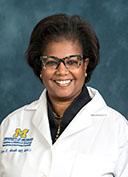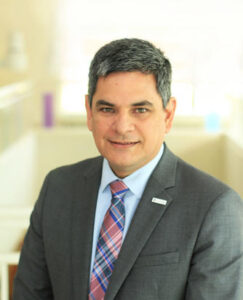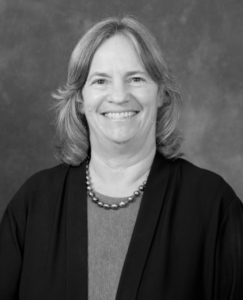
Hand of medical staff in blue glove injecting COVID-19 vaccine into arm of African-American man.

Hand of medical staff in blue glove injecting COVID-19 vaccine into arm of African-American man.
More Info
Michigan Institute for Clinical & Health Research
For more information, email [email protected].
Being deeply rooted in the wellbeing of Michigan communities meant that the Community Engagement program at the Michigan Institute for Clinical & Health Research, Michigan Medicine, and the U-M School of Public Health were on the frontlines when the pandemic hit the nation.
They witnessed a significant imbalance in support for low income and communities of color across the state, so MICHR and SPH came together to launch a program called “The Fierce Urgency of Now: Communities Conquering COVID.”
C3 was awarded nearly $1.4M by the National Institutes of Health as part of a new initiative called Community Engagement Alliance Against COVID-19 Disparities. Erica E. Marsh, MD, MSCI, FACOG, and Barbara A. Israel, DrPH, MPH, are heading the project alongside a 32-person team of dedicated researchers and community leaders, representing grassroots and faith-based organizations.

Erica Marsh
“Although the pandemic has magnified and amplified health disparities in Michigan, it has also fortified our commitment to community partners and their commitment to community members,” said Marsh, faculty director of MICHR Community Engagement. “We are invested, now more than ever, and stand shoulder-to-shoulder with our community and academic partners, ensuring that the communities we serve conquer COVID.”
C3’s focus is on a few of the counties most effected by the pandemic: Wayne, Genesee, Kent, and Washtenaw. Within these communities, they’re examining communication channels among the African-American and Latino populations in addition to messaging to promote healthy choices. Their approaches include educational outreach, community-based participatory research, and developing and disseminating communication materials to address misinformation and mistrust around COVID-19, vaccine trials, and the vaccine.
“We need vaccines that work in all Michiganders regardless of race, education, age, pre-existing health conditions, etc.,” said Marsh. “Once we have that, we need people feeling safe about taking the vaccine, so they will and protect themselves, their families, and their communities from COVID.”
C3 is guided by a steering committee that oversees all aspects of this project. The partner organizations involved are: Arab Center for Economic and Social Services, Bethel AME Church, Bibleway Outreach Ministries, Bridges into the Future, Buenos Vecinos, Community Based Organization Partners, Community Health and Social Services Center, Inc., Detroit Hispanic Development Corporation, Eastside Community Network, Friends of Parkside, Health Net of West Michigan, Historic King Solomon Baptist Church, National Center for African American Consciousness, New West Willow Neighborhood Association, and Spectrum Health.

Felix Valbuena
“Minority populations start at a significant disadvantage in receiving optimal health care for many reasons, and the COVID-19 pandemic has been no different in its significant impact on African-American and Latino populations,” said Felix Valbuena, Jr., MD, FAAFP, Chief Executive Officer of CHASS in Detroit. He serves alongside Marsh on CEAL’s national steering committee as well as C3’s. “Our collaborative efforts will work to bring science-based, culturally-proficient, resources to the communities we serve to improve the outcomes of this devastating pandemic.”
In one year, C3 will:
-
conduct studies using the principles of community-engaged research, which include partnerships between researchers and community organizations based on trust, equity, and mutual goals;
-
create a network of experts to increase awareness, knowledge, and trust among the communities involved;
-
host educational activities and open forums on findings to create a response plan; and
-
diversify COVID-19 intervention studies (e.g., prevention strategies and clinical trials of vaccines/therapeutics) by promoting them among appropriate populations.

Barbara Israel
“The disproportionate burden of COVID-19 on low-income communities and communities of color necessitates a comprehensive approach to examining and addressing the social and environmental factors that contribute to the disease,” said Israel, professor of Health Behavior & Health Education at SPH and Director of the Detroit Community-Academic Urban Research Center. “The active engagement of our community partners is essential to ensuring that our collective response to the pandemic is relevant and effective.”
CEAL is an NIH-wide effort led by the National Institute on Minority Health and Health Disparities (NIMHD) and the National Heart, Lung, and Blood Institute (NHLBI). Research Triangle Institute (RTI) International, a non-profit organization is responsible for overseeing the program which is taking place in 11 states.

